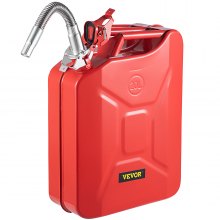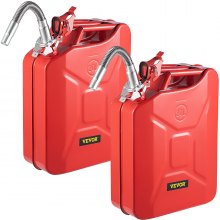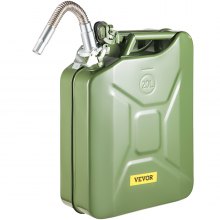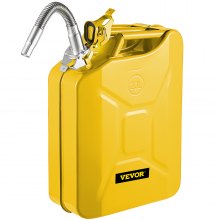Safe and Efficient Fuel Storage: Your Guide to Choosing Gas Cans
Fuel storage is an essential aspect of managing equipment that runs on gasoline, whether it's for your lawn equipment, recreational vehicles, or emergency power generators. Choosing the right gas can is not just a matter of convenience but also of safety. This guide will lead you through the essentials of selecting gas cans that ensure safety, durability, and ease of use.
Understanding the Types of Gas Cans
Before diving into the myriad options available, it's crucial to understand the different types of gas cans and their specific uses. From traditional metal cans to modern plastic designs, each has its advantages and scenarios where they shine the most.
Metal vs. Plastic Gas Cans
Metal gas cans are known for their durability and resistance to wear and tear, making them a favored choice for long-term storage. On the other hand, plastic gas cans are lightweight, less expensive, and rustproof, which appeals to many consumers for everyday use.
Safety Cans vs. Utility Jugs
Safety cans are specifically designed to minimize the risks of fire, spills, and vapor release, ideal for workplaces and areas where safety is paramount. Utility jugs, although not as advanced in safety features, offer convenience for transporting fuel for recreational or home use.
CARB-Compliant Gas Cans
CARB (California Air Resources Board) compliance means the gas can meets specific emissions and safety standards. While essential in California, choosing CARB-compliant cans is a wise choice everywhere for environmental protection and safety enhancement.
Features to Consider When Buying Gas Cans
When selecting a gas can, several features should guide your decision to ensure safety, convenience, and effectiveness.
Capacity and Size
Selecting the right size is vital for managing weight and ensuring portability. Gas cans typically range from 1 to 5 gallons. Consider your fuel usage and storage space when choosing the right capacity.
Spill-Proof and Child-Resistant Features
Safety is paramount when storing and transporting gasoline. Look for gas cans with spill-proof systems and child-resistant caps to prevent accidents and ensure peace of mind.
Ease of Pouring
A user-friendly design with an ergonomic spout, flexible hose, or trigger control mechanism can make refueling a cleaner and easier task, reducing the risk of spills and accidents.
Ventilation
Proper ventilation helps prevent vapor buildup and allows for smoother pouring. However, it must be designed to prevent leaks and ensure safety.
Durability and Materials
The material of the gas can affects its longevity and safety. High-quality plastics or metals can resist damage and prevent leaks, ensuring that your investment lasts longer.
Best Practices for Gas Can Usage and Maintenance
To ensure safety and longevity, follow these best practices when using and maintaining your gas cans:
Regular Inspection
Check your gas cans regularly for cracks, leaks, or rust. Replace them immediately if any damage is found.
Proper Storage
Store gas cans in a cool, well-ventilated area away from direct sunlight and out of reach of children and pets.
Avoid Overfilling
Leave space for expansion, especially in warmer weather, to prevent pressure buildup and potential spills.
Grounding and Ventilation
Always place the gas can on the ground when refueling to avoid static electricity buildup, and ensure proper ventilation to prevent vapor accumulation.
Gas Can Accessories for Enhanced Usability
Consider enhancing your gas can with accessories that improve safety and convenience:
Spouts and Nozzles
Upgrade to an automatic-shutoff spout or a longer, flexible nozzle to make pouring easier and safer.
Fuel Stabilizers
Adding a fuel stabilizer can prolong the life of the fuel and prevent engine problems, especially if the gas will be stored for an extended period.
Transportation Racks
For those who need to transport gas cans frequently, specialized racks can secure them safely to vehicles or trailers, preventing tipping and spills.
VEVOR's Commitment to Quality and Safety
When choosing your gas can, consider VEVOR, a brand synonymous with quality and safety in fuel storage solutions. Our range of gas cans is designed with your needs in mind, ensuring a safe, convenient, and efficient fuel storage experience.
Explore VEVOR's Selection of Gas Cans
Discover the ideal gas can for your needs in our extensive selection, featuring various capacities, materials, and safety features to cater to every requirement.
VEVOR's Safety Features
Our gas cans are equipped with the latest safety technologies, including spill-proof systems and child-resistant caps, to ensure the highest safety standards.
Durability and Design
VEVOR gas cans are built to last, crafted from high-quality materials that withstand harsh conditions and frequent use, ensuring that you get the most out of your investment.
Take Action: Choose Safety and Efficiency with VEVOR
Ensuring safe and efficient fuel storage is essential for any gasoline-powered equipment owner. By choosing the right gas can, you're not only making a wise decision for convenience but also for the safety of yourself, your family, and your environment. Explore VEVOR's selection today and experience the peace of mind that comes from knowing you're equipped with the best in fuel storage solutions.
FAQs about Gas Cans
What Are the Different Types of Gas Cans Available?
There are several types of gas cans available, each designed for specific needs and safety requirements. Metal gas cans are durable and resistant to wear, ideal for long-term storage and rugged use. Plastic gas cans are lightweight, affordable, and resistant to rust, suitable for everyday use. Safety cans are designed to prevent spills, leaks, and vapor emissions, providing an added layer of protection, particularly in professional or industrial settings. Finally, CARB-compliant gas cans meet strict emission and safety standards, making them a responsible choice for those conscious of environmental impact.
How Can I Safely Store Gasoline in Gas Cans?
Storing gasoline safely is crucial to prevent accidents and ensure the gasoline remains in good condition. Always store gas cans out of direct sunlight in a well-ventilated area, away from living spaces and ignition sources like heaters or electrical equipment. Use only containers designed for gasoline storage, and avoid overfilling them to allow space for expansion. Make sure the cans are clearly labeled and stored securely to prevent tipping or tampering. Regularly check your gas cans for leaks, cracks, or other damages and replace them if necessary.
What Is a CARB-Compliant Gas Can?
A CARB-compliant gas can meets the stringent standards set by the California Air Resources Board (CARB) for reducing harmful emissions from gasoline vapors. These cans are designed to limit the release of volatile organic compounds (VOCs) into the atmosphere, contributing to improved air quality and reduced environmental impact. While CARB compliance is mandatory in California, using CARB-compliant gas cans is beneficial everywhere, as they help minimize fuel evaporation and spillage, making them safer and more environmentally friendly.
How Long Can I Store Gasoline in a Gas Can?
The shelf life of gasoline stored in a gas can vary based on several factors, including the type of fuel, storage conditions, and whether a fuel stabilizer is used. Generally, gasoline can be stored for three to six months in a properly sealed and vented container. Adding a fuel stabilizer can extend this period up to a year or more by preventing oxidation and degradation of the fuel. To ensure the best quality and safety, use stored gasoline within this time frame and replace it with fresh fuel if it exceeds its shelf life.
Can I Use Any Type of Container to Store Gasoline?
No, it is important to use only containers specifically designed for gasoline storage. These containers are made from materials that can withstand the properties of gasoline and are equipped with features like flame arrestors and pressure-relief valves to ensure safety. Using inappropriate containers, such as food or beverage containers, can be extremely dangerous as they might not provide adequate sealing and can cause chemical reactions, leaks, or fires. Always choose approved gas cans that meet safety standards for the safe storage and transportation of gasoline.





































































































